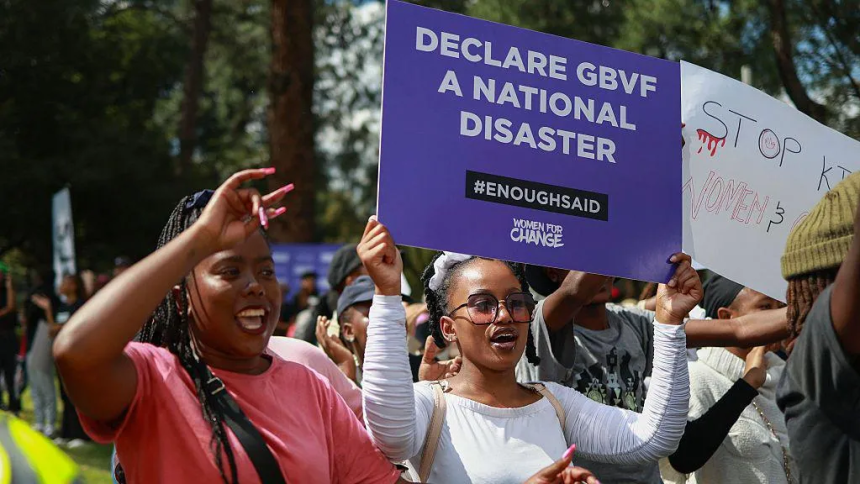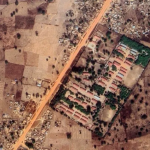South Africa has declared violence against women a national disaster following an online campaign culminating in countrywide protests on Friday.
Women were urged to “withdraw from the economy for one day”, and lie down for 15 minutes at 12:00 local time (10:00 GMT) in honour of the 15 females who are murdered in the country every day.
The state had refused to make the classification but changed tack after “evaluating the persistent and immediate life-safety risks posed by ongoing acts of violence”.
South Africa experiences some of the world’s highest levels of gender-based violence (GBV), with the rate at which women are killed five times higher than the global average, according to UN Women.
The National Disaster Management Centre (NDMC) has classified GBV and femicide a disaster following “a thorough reassessment of previous reports and updated submissions from organs of state as well as civil organisations”, said Cooperative Governance and Traditional Affairs Minister Velenkosini Hlabisa.
The NDMC had earlier said calls to make the declaration did not meet legal requirements.
Warning: This report contains descriptions of sexual assault
Fridays “lie downs” happened in 15 locations across South Africa, including major cities such as Cape Town, Durban and Johannesburg.
Allies in Eswatini, Kenya and Namibia have also expressed their support for the protest and say they joined in.
The demonstrators wore black as a sign of “mourning and resistance”.
The protest, dubbed the G20 Women’s Shutdown, has been organised by Women for Change, which has also been spearheading the online campaign that has seen many people, including celebrities, change their social media profile pictures to purple – a colour often linked to GBV awareness.
There has also been an online petition, signed by over one million people.
On Thursday, President Cyril Ramaphosa told the G20 Social Summit that South Africa had “declared gender-based violence and femicide a national crisis” in 2019.
Shortly afterwards, Mr Hlabisa confirmed it had been upgraded to a national disaster and that an announcement would be made on Friday, according to Women for Change.
The organisation shared a statement on its Instagram page on Thursday welcoming the news and telling its followers “we have won” and that their “persistence has been recognised”.
“We have written history together [and] we have finally forced the country to confront the truth,” it said.
The declaration allows the government to strengthen its support for current GBV and femicide response structures, implement its contingency arrangements and “ensure that all necessary mechanisms are activated to enable [it] to manage the disaster effectively”.
Before the announcement, Women for Change spokesperson Cameron Kasambala told the BBC that “so many beautiful acts and legislations” had been followed by “lack of implementation and transparency” on the government’s part.
“We’ve integrated violence… into our culture [and] into our social norms,” she said.
“Once the government truly reacts to this issue, I feel like we’ll already be able to see a reaction on the ground. Because they set the precedent and the tone for how the country responds.”
Grammy-award winning singer Tyla is among the thousands of celebrities and citizens who have rallied behind the call and changed their social media profiles. Some have gone further, posting pictures of purple hearts, nail polish and even clothing in what has since been dubbed the “purple movement”.
A South African professor who asked to remain anonymous told the BBC she had taken leave so she could travel to Johannesburg from Free State province to take part in the silent protest.
It’s important for her because she said she had second thoughts about simple things like jogging and hopes that the protest will “slow the scourge” of GBV.
However, some women have faced a backlash from employers for wanting to participate in the protest. One product designer who works for a major cooperation said they were strongly advised against taking part.
Some women who feel the government is not doing enough have taken matters into their own hands.
Lynette Oxeley founded Girls on Fire to help women protect themselves through gun ownership. It is legal to own a firearm in South Africa for self-defence if a person has a valid licence.
Most of the women in her group have been raped, attacked, robbed, or experienced some level of violence.
Prudence joined the group after she was raped in 2022.
“I said: ‘No’. I screamed, I cried but he didn’t take no for an answer,” she told the BBC.
Trying to find justice was an “uphill battle” as her case was withdrawn because her rape kit – the DNA they take after the crime – was lost.
It isn’t a “police problem, it is a nation problem,” she said.
Although the women are trained to shoot firearms, Ms Oxeley said using a gun was a “last resort”.
“It’s not about actually defending yourself with a firearm. I want ladies to change what they think about themselves. Stop being silent,” she said.
“Even if you do not win the fight, at least you are fighting back.”














